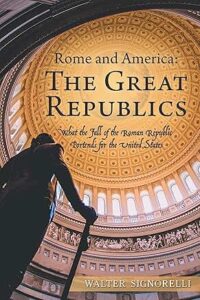Title: Rome and America: The Great Republics: What the Fall of the Roman Republic Portends for the United States
Author: Walter Signorelli
Publisher: Ewings Publishing LLC
ISBN: 979-8894191126
Pages: 572
Genre: Historical / Political Science
Reviewer: Ephantus M.
Hollywood Book Reviews
Rome and America: The Great Republics: What the Fall of the Roman Republic Portends for the United States by author Walter Signorelli is a compelling and thoughtful book that carefully compares two great republics; ancient Rome and the modern United States. It poses a profound and thought-provoking question about whether the United States is destined to experience a fall similar to that of ancient Rome – perhaps even in the near future.
The book profoundly explains how both countries began by fighting for freedom, highlighting how the Roman Republic removed its kings, and how the American colonies broke away from British rule. The author states both nations believed in laws, justice, and giving people a voice in government and that’s why Rome had elected leaders, courts, and public assemblies just as America has a Constitution, elections, and a Congress. These systems, he argues, were designed to stop any one person from gaining too much power.
But while both republics experienced tremendous growth and development, they also faced dangers according to Signorelli’s findings. Rome grew richer and stronger but also more divided as the gap between rich and poor increased, with leaders turning to care more about themselves than their country. Eventually, civil wars followed, and strong generals like Julius Caesar took over. In no time, Rome stopped being a republic and became an empire ruled by emperors. By sharing this chilling but priceless historical detail, Signorelli warns that America could face the same danger if it forgets its core values.
The book is well-organized and easy to follow with each chapter focusing on one idea such as politics, wealth, war, class, or leadership. The author does a great job connecting Roman events to American ones. For example, Aaron Burr is compared to the Roman Catiline, and Julius Caesar’s rise is compared to modern executive overreach. By understanding how history repeats itself, readers will be able to empathize with the book’s fears about America’s future thanks to these insightful and astute comparisons.
Readers will appreciate Signorelli’s message and exposition on the danger of extreme partisanship particularly his warning that when people hate each other just for being in different political parties, a nation weakens. This, he explains, is something that happened in Rome and something he fears could happen in America. Another strong message is that a republic needs more than good laws – it needs good citizens and leaders who follow them. It is striking how the book effectively brings out the comparative significance of history. By studying Rome’s history, the author firmly believes Americans can steer clear of similar mistakes which took Rome down. Readers will appreciate his optimism that America can endure provided its citizens uphold the rule of law, remain committed to truth, and prioritize the republic over individual ambition.
Readers with an interest in legal systems, civic duty, and cultural change will appreciate how the book shows how societies can lose their way when they forget what made them great in the first place. They will also admire the author’s approach, how, rather than resulting to scare his audience, tries to teach and inspire them, while respecting their ability to think and make good choices. The writing style is clear and direct. The book reads like a series of lessons or stories, not a “dry” textbook which makes it especially engaging for students, teachers, and history enthusiasts. The author’s ability to discuss weighty topics like war, slavery, and political violence in a courteous and comprehensible manner is not only remarkable but also inspirational to readers and fellow writers alike.
Rome and America: The Great Republics: What the Fall of the Roman Republic Portends for the United States is more than a history book. It’s a warning and a call to action as well as a firm reminder that since freedom is never guaranteed, it must be protected by laws, by leaders, and by each of us. Meticulously researched and powerfully argued, this book is essential reading for anyone concerned about democracy and the survival of free institutions.That is what makes this book so important, and why people of all ages should read it.

